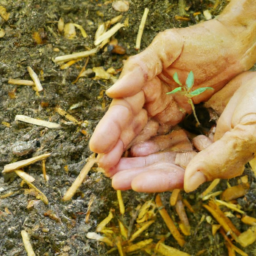Gardening and the Environment How Does It Help
How Does Gardening Help The Environment
How Does Gardening Help The Environment?
Gardening is an age-old hobby that has not lost its relevance in the modern day. In addition to providing food, flora, and a place of peace and contemplation, research and studies have unveiled the numerous ways gardening provides various ecological benefits. Here are some of the top ways gardening helps the environment:
Humans & Ecosystem Impact
Gardening helps reduce greenhouse gas production by providing an alternative to large-scale industrial farming. Gardens allow for better management of resources and the soil, as they can be built in such a way as to ensure rainfall collection and water usage is optimized. This also helps reduce CO2 and other emissions that agriculture production produces. Another great benefit of gardening is the human connection it brings to nature. Studies have shown that adding a garden to an area tends to lead to an increase in appreciation and care for the outdoors from nearby human residents.
Biodiversity Benefits
A diverse garden can bring a multitude of species from both plants and animals into an area. Different gardening practices like crop rotation and no-till reduce soil damage, which in turn helps increase the species found in the garden, including rare plants. This is further augmented by the inclusion of native produce, and the planting of certain flowers to encourage the presence of beneficial pollinators like bees, butterflies and birds. All of these species bring benefits like increased food productivity, as well as providing a habitat where these animals and plants can survive and thrive.
Erosion Control & Water Conservation
Healthy plants have better retention and uptake of water, thus helping gardeners to reduce their overall water consumption. This is further compounded by practices such as xeriscaping and planting native plants. Plants also aid in controlling soil erosion, by holding the earth in place through their root system, as well as preventing the impact of salt accumulations and nutrient runoff caused by overexposure of the soil and water to sun and wind.
Air Quality Improvement
Gardens help to purify their related environment, by generating oxygen and absorbing pollutants from the air. This is especially true for certain plants like Banana trees and grasses, which are especially adept at air cleansing and purifying. Gardens also act as temperature regulators, no matter the season. Plants act as barriers against summer heat, and are also able to radiate heat from winter days.
Food Self-Sufficiency & Resilience
Going the extra mile and adding a vegetable garden to any personal or public green area is a surefire way to achieve greater levels of self-sufficiency. A community garden or small garden patch isn't limited to food production, but can also produce other useful items such as oils, cooking spices, and even natural medicines like aloe vera and basil. Community gardens add a certain level of grass-roots resilience, in that by connecting people to nature with a shared goal, one is able to create a strong sense of community and collaboration.
Brief Recap
Gardening offers a plethora of benefits for the environment, from reducing human impacts to creating wildlife havens. Gardens are an efficient way of reducing Co2 and other emissions, and are renowned for their water conservation properties and soil retention. Taking things one step further, gardens can be used to bring people together around a common goal of self-sufficiency and environmental stewardship. So whether it's a small home garden or an expansive public green-space, gardens are sure to bring a unique touch of nature to anyone's backyard.
References:
Blair, Emily. 9 Ways Gardening Benefits the Environment. Earth911.com, Earth911, 23 Apr. 2018, https://www.earth911.com/eco-tech/9-ways-gardening-benefits-the-environment/.
Gardening & Wildlife. Royal Horticultural Society, www.rhs.org.uk/advice/profile?pid578.
Shi, Frank. 5 Benefits of Gardening for the Environment. Eartheasy.com, 15 Mar. 2011, https://eartheasy.com/5benefitsofgardeningfortheenvironment.

Previous Page
Next Page
